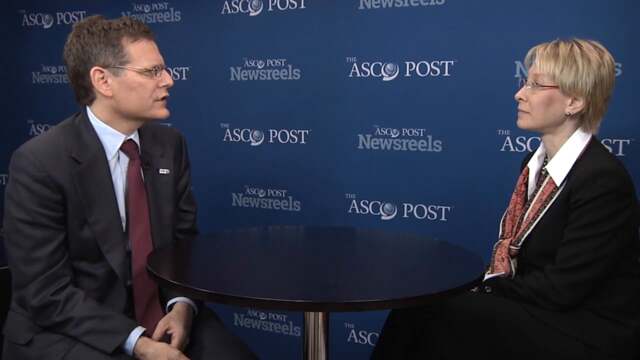Asher Chanan-Khan, MD, Summarizes Ibrutinib, Bendamustine, and Rituximab in Previously Treated CLL/SLL
2015 ASCO Annual Meeting
Asher Alban Chanan-Khan, MD, of the Mayo Clinic Cancer Center, discusses an important treatment option that significantly improved overall response rate and reduced risk of progression or death by 80% (Abstract LBA7005).
Maura N. Dickler, MD and Clifford A. Hudis, MD
Clifford A. Hudis, MD, and Maura N. Dickler, MD, of Memorial Sloan Kettering Cancer Center, discuss adding bevacizumab to letrozole as a first-line endocrine therapy for treatment of hormone receptor–positive advanced breast cancer (Abstract 501).
Richard G. Margolese, MD
Richard G. Margolese, MD, of McGill University discusses the improvement in breast cancer-free interval with anastrozole vs tamoxifen in patients with DCIS undergoing lumpectomy plus radiotherapy (Abstract LBA500).
Thomas W. LeBlanc, MD, and Eric Roeland, MD, FAAHPM
Thomas W. LeBlanc, MD, of Duke University Medical Center, and Eric Roeland, MD, FAAHPM, of the University of California, San Diego Moores Cancer Center, discuss the use of palliative and hospice care for patients with solid tumors vs hematologic cancers and clinicians’ attitudes (Abstracts e20554 and 9524).
Nicholas C. Turner, MD, PhD
Nicholas C. Turner, MD, PhD, of the Royal Marsden Hospital NHS Trust, discusses fulvestrant and palbociclib as a treatment option in pre- and postmenopausal women with hormone receptor–positive, HER2-negative metastatic breast cancer that progressed on prior endocrine therapy (Abstract LBA502).
Sagar Lonial, MD, and James O. Armitage, MD
James O. Armitage, MD, of the University of Nebraska Medical Center, and Sagar Lonial, MD, of Emory University School of Medicine, discuss results from two important studies that tested lenalidomide/dexamethasone with or without elotuzumab and daratumumab monotherapy (Abstracts 8508 and LBA8512).





